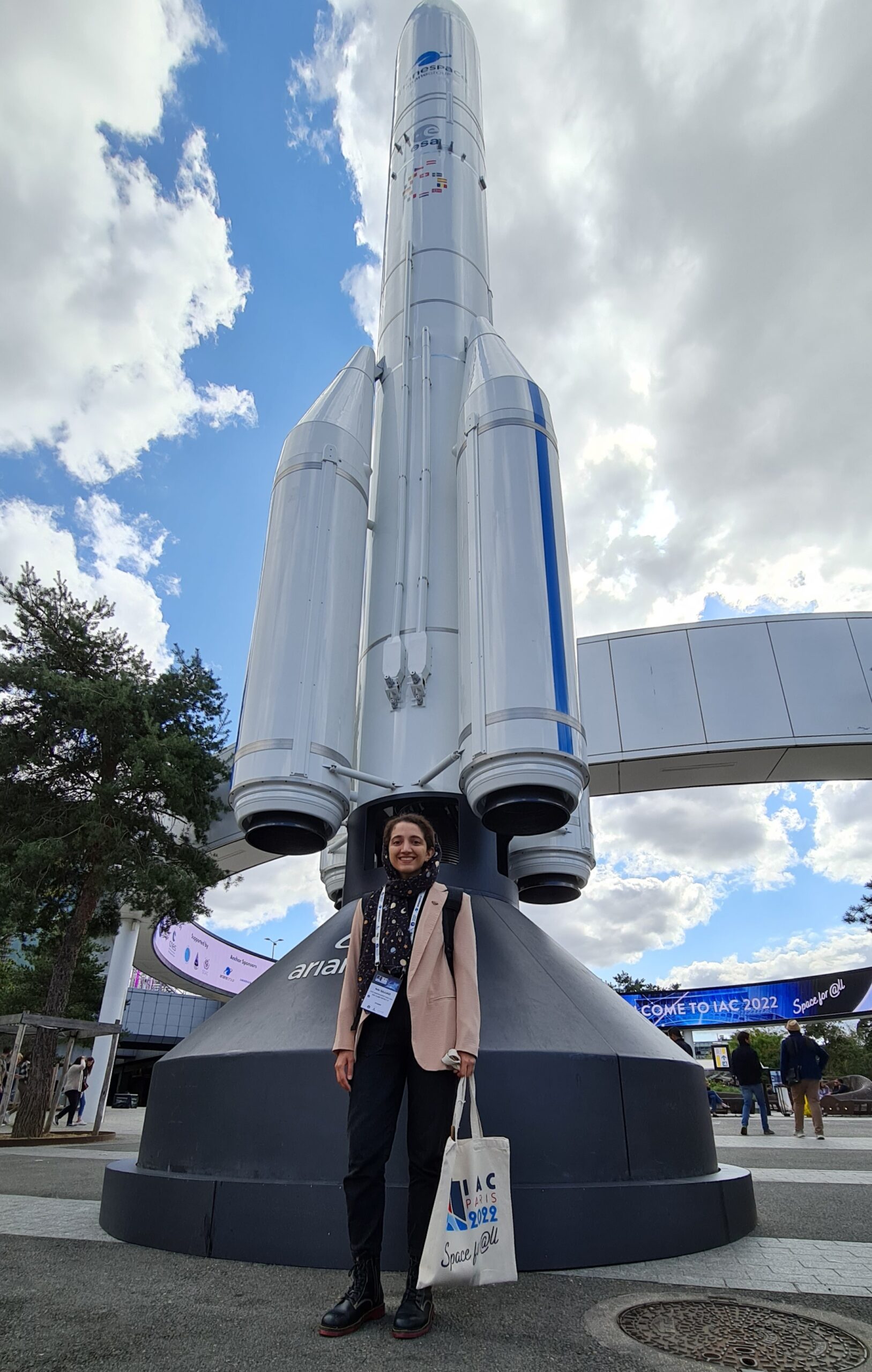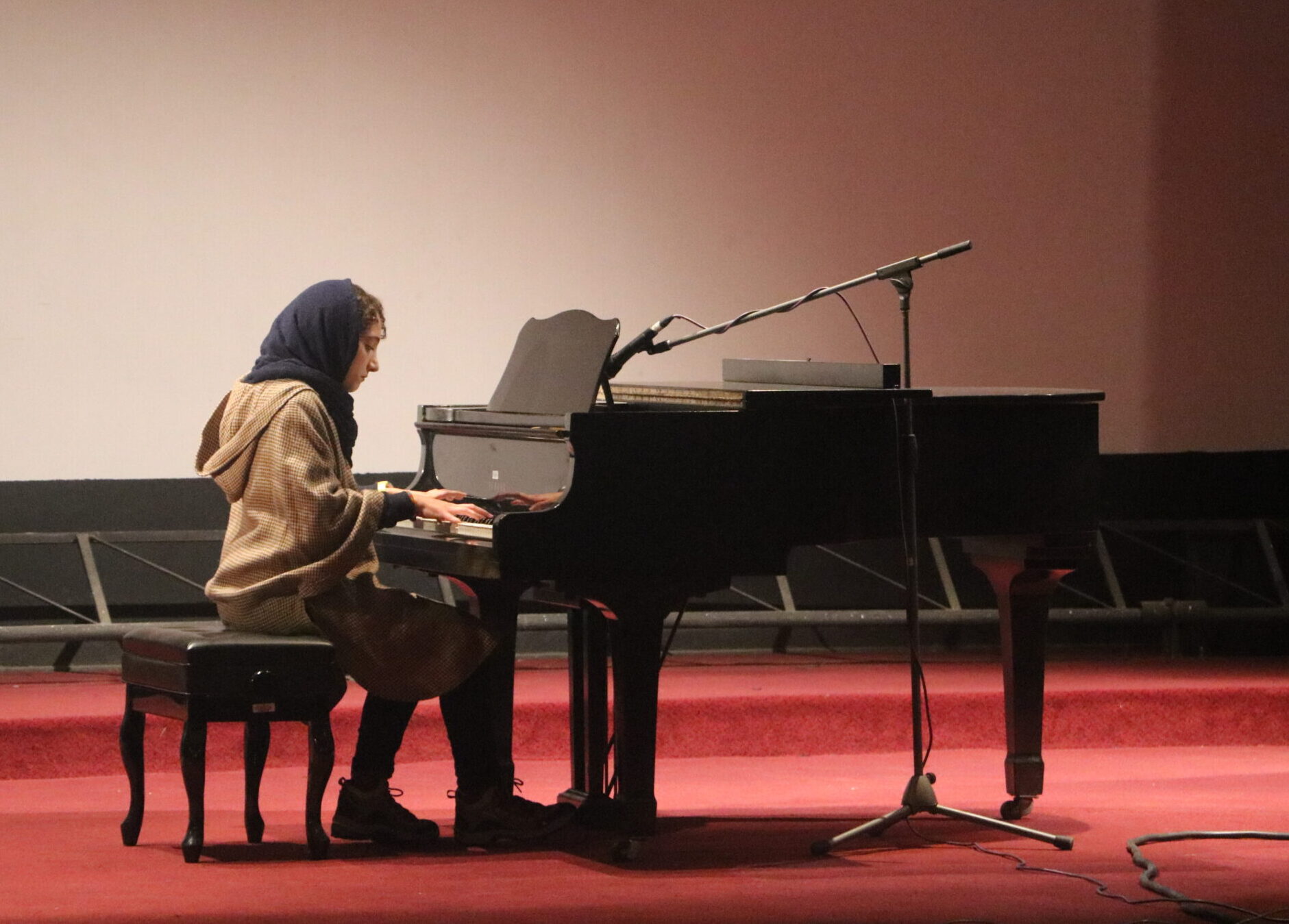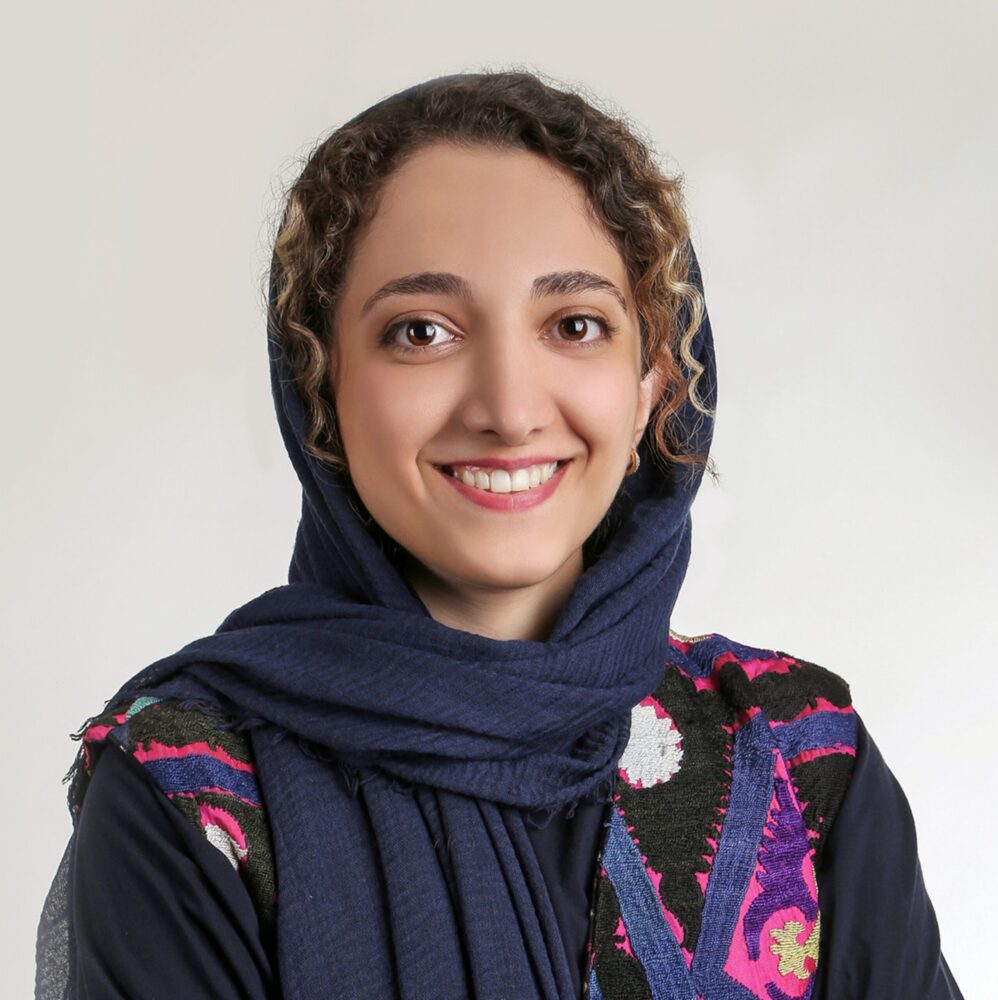Growing up in a country with limited resources and opportunities in space exploration, Niki Sajjad knew from a young age that she would have to work hard to achieve her dreams. But she didn’t let that discourage her. She was determined to make a difference, and that determination paid off.
Niki Sajjad is an enthusiastic space engineer with a Bachelor’s in Electrical Engineering from the Isfahan University of Technology and a Master’s in Space Engineering from K.N. Toosi University of Technology in Iran. She is highly motivated to work toward sustainability to serve humanity and pave the way for the next generations to become key players in the space sector, especially in non-space-faring countries. Since 2017, she has been a member of three different student satellite projects as an ADCS (Attitude Determination and Control System) and HIL (Hardware-in-the-Loop) engineer. She is currently pursuing her PhD in Space Engineering. Niki has won many awards with the recent one being as IAF (International Astronautical Federation) Emerging Space Leaders Grantee. Read more to uncover her inspiring journey.
Can you describe your childhood and how it influenced your choice of bachelor’s studies in Electrical Engineering?
I was born and raised in Isfahan, a large historical city in Iran, which has art, technology, and unique culture within its heart. I was fortunate to have educated and open-minded people around me. Being surrounded by people in STEAM from childhood, I had no doubt that I wanted to do something in these fields. But the path was not clear and linear! My goal changed every year. From the first year of elementary school to the last year of high school, I envisioned myself as a dentist, ophthalmologist, architect, medical engineer, computer scientist, and as an electrical engineer. My family, friends, teachers, books, and documentaries played key roles during my childhood! Above all those interests, Robotics came to the top of my list when my dad was leading a robotic team in 2008. Coding, soldering, circuit design, and hands-on work were super interesting activities for me. It led me to choose electrical engineering as a major in 2013.
What motivated/inspired you to transition from Electrical to Space for your Master’s? How was the transition?
Space is always an inspiration for anyone living on Earth. We all have this curiosity to know more about what is going on up there. While I was doing my bachelor’s, space and astronomy made up a large part of my free time. Space was a place for me to remove all boundaries and geographical borders, I could think freely, and imagine anything beyond my limits. I was still interested in robotics and hands-on work but wanted to implement this in space. I got my B.Sc. in electrical engineering/control systems and dreamed of controlling a spacecraft in orbit. I have dreamt that space would be my workplace for many days and nights. It was a big transition though. Electrical engineering and aerospace engineering do not have too much in common in our curriculum. I had to pass some important prerequisites, adapt to a different environment, learn a lot, and work a lot to gain basic knowledge of mechanical systems. At the same time, my background in programming, hardware design, and working with electrical components helped me a lot to be a good match for satellite teams. I joined a satellite project as a control engineer in the first semester of my master’s. It was something that I thought would happen ideally in 10 years but miraculously became true so early. It was hard, but I was motivated to work on it, do my best, and see progress.
You have worked on many technical projects. Can you describe a project that you loved working on?
The Student Small Satellite (SSS) project was an international project initiated by Asia-Pacific Space Cooperation Organization (APSCO). It was a constellation of three satellites, two CubeSats, and one microsatellite developed by students of the member states. My university (K. N. Toosi the University of Technology) was responsible for developing the Attitude Determination and Control Subsystem (ADCS) of the microsatellite (SSS-1). I was involved in different phases from design and simulation to implementation and testing. It was a unique experience that opened up many doors for me. I loved working on it not only because it was my first satellite experience, but also because it was a real international student satellite supposed to be seen in orbit. Despite the struggles, the satellite was launched into space in October 2021 and has been operating in orbit.
You have worked on many technical projects. Can you describe a project that you loved working on?
Doing research and discovering new horizons in space became a pleasant journey that I loved to continue. I was thinking of doing a PhD during my Master’s. As time passes by, many things might change, but I was getting more confident in the path I wanted to choose. Doing research, working in academia, motivating other students, and sharing experiences with them in a dynamic environment were so close to my heart! I could find all these things in doing a PhD.

How is your PhD journey?
When I started my PhD in Space Engineering, I didn’t have a precise vision of what I would like to work on. I knew that I wanted to continue working on the satellite control system, but there were many choices and many new challenges in this field. Working in space is super interesting because there are always many open problems being discussed every year. I started thinking of the issue of space debris and the challenges we currently have in guidance, navigation, and control system to get close to these pieces, grab them, and take them out of their orbits. By joining Space Generation Advisory Council (SGAC), I gained more interest in space sustainability and its importance for Earth. The problems that we are currently dealing with space debris became more significant to me and I completely moved my research to this field. I got the opportunity to join international webinars, conferences, and workshops. I contemplated finding a position to tackle this issue. Space debris and space sustainability are not priorities in my country. So, finding my place as a real member of the space sustainability community was challenging. What motivated me to continue (and still motivates me every day) was: if you love a topic to work on but it doesn’t exist around you, work on it and make it an existing topic for the next generation. If something is so valuable for you but is not a priority for others, make it a priority for the younger generation. The key enabler was the huge support from my supervisor that led me to choose space debris tracking as my PhD topic. Can you share your experience as a member of the Space Generation Advisory Council (SGAC) and how this helped you pursue your dream?
SGAC is the highlight of my space life. SGAC connected me to the entire world. It removed many barriers and made me believe that we can be a part of the international space community wherever we are located. I joined SGAC during the first days of COVID quarantine when I was ambiguous about what I can do outside the lab. It was the time when we, all of us on Earth, were in the same challenge in life and were trying different ways to stay connected virtually. It made a huge shift in my career. SGAC incredibly expanded my network, made me closer to real-world problems, and let me see the Earth from a different perspective! After joining SGAC, I made all my space activities toward sustainability, whether making space activities safer or making Earth’s system more sustainable using space. SGAC made the path clearer and let me better understand my values in the space sector.

Coming from a non-space-faring country, what were the challenges you faced? What would be your advice to women/girls coming from such countries to better utilize opportunities?
The first challenge of being a space engineer in a non-space-faring country is proving that you are doing something important that can help everyone’s life. In my country, not many people know why we should invest in space and what the point of working in the space sector is. When there is poverty, food insecurity, water shortage, and many more challenges in a country, investing in space does not make sense to anyone. You should convince people that space can be an asset that helps us make life better on Earth. You should make kids and youth motivated to dream big and push their boundaries. The second challenge is proving yourself, your abilities, and your skills as a girl to everyone. Space is a male-dominated sector even in space-faring countries. It is always challenging if you don’t have those who believe in you and encourage you to continue. It is sometimes more challenging in non-space-faring countries or conservative nations. My short advice to women/girls is to believe in themselves and find a supportive community that helps them make this belief stronger. Slow down if you are in a difficult situation, think more, find your values, and go towards the opportunities you would love to grab in life.
You’ve worked on projects with industrial tie-ups, what made you choose academia? What are the advantages and disadvantages of working in academia vs. industry?
Yes, during my Master’s, I had the opportunity to work on a real satellite project and be involved in different phases of that. We had partnerships with industry and I had this chance to work on an industrial project and experience its ups and downs. I have always loved hands-on activities, and industry seemed to be the best option for me. But as months went by I realized that I still wanted to stay in academia and do more research. I like the learning and training atmosphere that academia provides. There are many different jobs. You can work in a flexible workplace that gives you open opportunities to explore and learn as much as you want. But some other jobs do not provide this flexibility and push you to play a specific role in a strict environment for years. It is up to you to choose the workplace that fits your interests. Taking a job is usually more practical and hands-on than doing a PhD, but sometimes might limit your curiosity. Both are worth trying if someone is interested in both. It would give a better idea of what they look like.
Are scholarship opportunities available for students to pursue a career in Space?
There are many scholarships available in the space sector. The more you expand your network and get to meet people worldwide, the more you find interesting scholarships. They are usually offered for conference participation, summer camps, higher education studies, and research partnerships. It is nice that some scholarships are specified for undeveloped/developing nations. If you know your plan and can show how passionate you are to take steps toward it, scholarships are for you!
Could you describe your experience in teaching and mentoring students?
Teaching and guiding students have helped me find joy in what I do. Previously, I was dreaming of working in industry and manufacturing spacecraft. But when I got the chance to teach or transfer my knowledge to others, I could find the happiest moments during the day. It gives me deep joy when I see the spark in students’ eyes while learning something new! I have tried to motivate them even in hopeless times. It feels to be my main mission as long as I am here.
What advice would you like to give to women who wish to work in the domain of Space?
As I mentioned before, women and girls should strongly believe in themselves and their abilities. Many factors like society, culture, economy, politics, and religion would cause people to discourage girls from pursuing their dream job. But finding a supportive community would help to get out of your comfort zone and move toward your dreams.
What were your biggest obstacles throughout your journey?
I think geographical borders have been the biggest obstacle for me. My definition of “border” might be different from someone else’s. Making people of the Earth believe that you are a human like others who love to work in the space sector and bring forth peace and unity on our planet, has been so challenging for me. It has been the biggest obstacle, but I have put too much energy to get through this. I love space because it is borderless, but the space sector on Earth still depends on borders.
Were there any instances in your journey that made you feel proud of yourself?
My proudest moments have been every single time I felt heard. Receiving awards, presenting my work to experts, having big stages at conferences to talk about my projects, or even seeing the wide-open happy eyes of a kid listening to my words about space, makes me proud. Receiving the Emerging Space Leaders award at the huge stage of the IAC was one of these wonderful moments.

What do you do to unwind during your free time?
Physical activities like running and biking in the city or nature make up a huge part of my free time. I also compose and play music with different instruments which opens my mind and heart when things get tough. Chatting and hanging out with friends and family also make quality time in my life.
You have several awards and published in Space conferences. What skills help you innovate and demonstrate excellence in the field you work in?
I am not sure if I have innovated anything in my field. I just try to see challenges, embrace them, and come up with some practical solutions. Being connected to people, interacting with a diverse community, and seeing problems through their eyes can help us become more creative. If you think something should be done, believe in it. Your belief would take you to the right path and help you see results.
What is your future goal?
My long-term goal is to travel the world and inspire people/kids in undeveloped or developing nations to think of space and push their limits. In the past five years, I have been working on the development of simple hands-on packages to make it possible for everyone with a limited budget to get access to space hands-on training. It helps me get closer to the dream of increasing accessibility to space education for everyone. My everyday goal is to continue working on space projects that develop sustainability in space and on Earth.
Niki would like to be known as a space researcher and engineer who dreams of making Earth a better place for everyone, helping people move toward their dreams, and making life easier for the next generation in Iran and other countries lacking equality.
People around us can change our minds over time. Some of us follow in our parent’s footsteps. Some go in a direction that a friend is choosing, and some may be influenced by a teacher or any role model in life. I don’t know what I would be without all the people who inspired me and pushed me to go out of my comfort zone. I would like to do the same for others.
